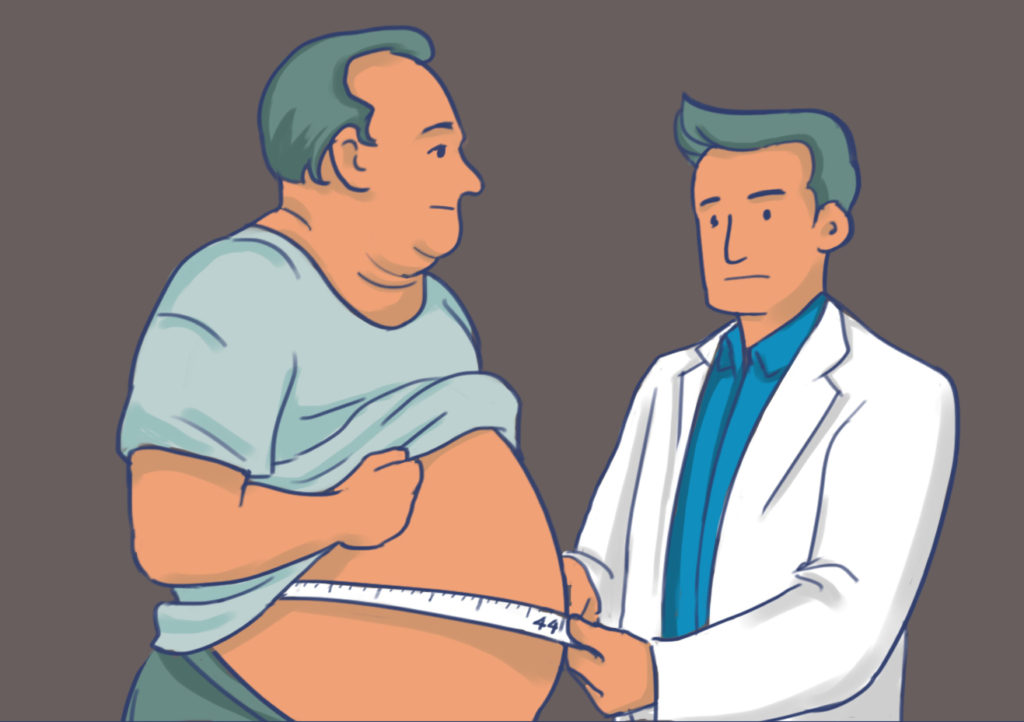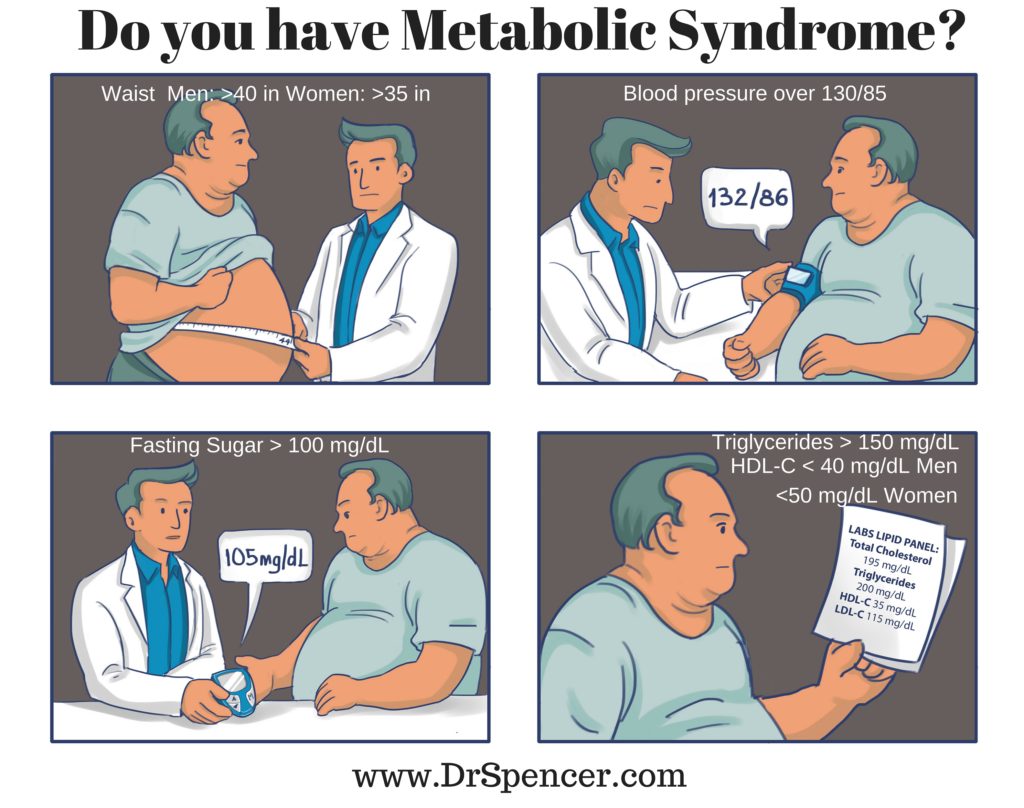Have some excess weight around your belly with slightly elevated blood pressures/sugars/triglycerides and/or low HDL-C? The doctor may tell you they are just small blips in your labs, but your risk of developing heart disease and diabetes are 2-5 times higher if you have 3 of those things in the cartoon. This is called “Metabolic Syndrome” and is a serious health threat.
The Dreaded “Belly Fat”
 Have you ever noticed folks who have an increased belly size but you can’t actually pinch much fat? While cosmetically, people don’t like their bellies overlapping their belt, the real danger is what is going on beneath. The reason you can’t pinch the fat is because the fat is actually surrounding your organs within. This is called “visceral fat.” This is what is thought to be the underlying cause of “Metabolic Syndrome.” We used to think that fat was inert, meaning that it sat there on our body only serving as a place to store energy. Now we realize that our fat cells are metabolically active, sending out hormones/signals to our body. Some good, some bad.
Have you ever noticed folks who have an increased belly size but you can’t actually pinch much fat? While cosmetically, people don’t like their bellies overlapping their belt, the real danger is what is going on beneath. The reason you can’t pinch the fat is because the fat is actually surrounding your organs within. This is called “visceral fat.” This is what is thought to be the underlying cause of “Metabolic Syndrome.” We used to think that fat was inert, meaning that it sat there on our body only serving as a place to store energy. Now we realize that our fat cells are metabolically active, sending out hormones/signals to our body. Some good, some bad.
In regards to this belly fat (visceral adiposity is the technical term), it seems to be causing all sorts of issues in our bodies. This results in what shows up as “Metabolic Syndrome.”
So what exactly is Metabolic Syndrome?
Metabolic Syndrome is a group of related factors/signs/symptoms that increase our risk of heart disease and type 2 diabetes and death. Here are the criteria (you need 3 of the following).
- Increased Waist Circumference: Men with waists greater or equal to 40 inches (102 cm) and women 35 inches (88 cm). In places other than the USA, the cutoffs may be much lower (e.g South Asia 90 cm for men and 80 cm for women). Remember to measure your waist circumference correctly. It is not your pants waist size. Measure parallel to ground just above your hip bones. Remember that this is likely the cause of the rest.
- Elevated Blood Pressure: A blood pressure over 130/85 mm Hg.
- Elevated triglycerides and/or Low HDL: Triglycerides over 150 mg/dL is one component. Having low HDL-C is another. For guys, under 40 mg/dL and women under 50 mg/dL HDL-C is criteria. Each of these components can count towards the criteria (high triglycerides as one and low HDL-c as another). Many have both though.
- Elevated fasting sugars: A fasting blood sugar of 100 mg/dL and above. Could also be what is called “impaired glucose tolerance” if you do a glucose tolerance test. This is where you drink beverage with 75 grams of glucose in it and then test your blood sugar after 2 hours. If it is above 140 mg/dL, then you have “impaired glucose tolerance”.
Why does this happen and what can I do about it?
As mentioned above, when we gain weight around our bellies, the fat starts sending out signals that cause the above. In order to reverse it, we must lose that fat, which is the underlying issue.
In my book I get into the specifics but here is the gist:
- Plants and protein: Get most of your food from vegetables, fruits, and legumes with a side of lean protein. This will keep you full while decreasing your overall calories, allowing you to lose fat while keeping muscle. These high quality foods also have special properties that may decrease the inflammation involved in Metabolic Syndrome as well. Whole grains are fine too (especially oats), but you want to make sure you’re actually getting whole grains as opposed to refined. Oh yeah, and don’t drink sugar sweetened beverages (e.g. soda, sweet tea, and juice).
- Lift weights and get in some cardio: Think lifting weights is just for bodybuilders and meat heads? Think again. Lifting weights is much more than just building biceps, it’s building health! Shoot for at least a couple times a week doing full body lifting. Just as important is aerobic training (cardio). Go for walks with family and friends. Get out for lunch and enjoy the day. If you can run/bike/swim and you enjoy it, do it. Shoot for 30 minutes of this at least per day if possible.
- Sleep at least 7 hours per night: We are finding that sleep is probably just as important as diet and exercise. Without it, our bodies don’t function properly. Those things listed as criteria for metabolic syndrome worsen without sleep. If you do have metabolic syndrome, you will also want to make sure you don’t have Obstructive Sleep Apnea. Otherwise you won’t likely be getting a good night’s sleep.
- Medicine: Maybe you need some medicine to help you out along with the above. If you need help with hunger and changing your eating habits don’t work, ask your doctor about approved weight loss medicines. You may also want to consider the drug metformin as it helps improve those signals sent out by your belly fat, which can lower your blood sugars etc.
Remember, if you have Metabolic Syndrome, it isn’t too late. With a few changes, you can reverse it.

